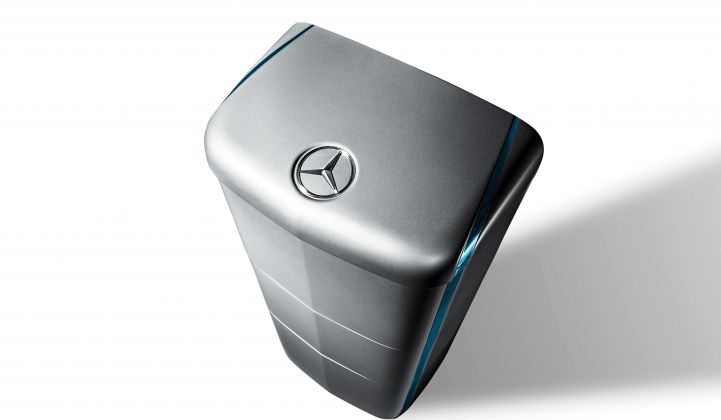For a tiny market, solar-plus-storage has driven several high-profile corporate partnerships.
On Thursday, No. 3 residential solar installer Vivint finalized an "exclusive strategic collaboration" with Mercedes-Benz Energy to deliver solar-plus-storage systems. This marks the first storage alliance for Vivint, as well as the first solar partnership for the U.S. branch of Mercedes-Benz's energy division, which packages the company's automotive batteries for stationary applications.
Residential storage remains a diminutive market in the U.S., accounting for fewer than 1,000 systems deployed last year, according to GTM Research. Despite this market's diminutive stature, the big players in the solar industry have pounced on strategic partnerships that set them up to deliver as falling battery prices and changing tariffs make the economics more alluring.
Leading residential solar company SolarCity has now merged with Tesla, bringing solar and storage expertise together under one roof.
The No. 2 solar installer, Sunrun, partnered with LG Chem to create its BrightBox hybrid offering, which went on sale in Hawaii and California last year. The company has delivered 1,000 of those systems so far.
Tesla and LG Chem both rank among the highest-volume battery producers in the world, with plenty of experience operating in the young U.S. storage market. Mercedes-Benz just set up shop in the U.S. in November.
Mercedes-Benz pitches its electric products as a complete electrified home solution, and solar plays a crucial role in that vision.
“As Mercedes-Benz electrifies its vehicle fleet, solar plus storage is essential to enable those vehicles to be powered by clean energy,” said Boris von Bormann, CEO of Mercedes-Benz Energy Americas, in a statement.
The offering goes on sale in California at the end of May, with cash purchase and financing options. Currently, Vivint is the exclusive direct-to-home provider for the Mercedes-Benz systems, but more distribution channels are expected soon.
Grid analysts and solar companies alike have been eyeing solar-plus-storage as a growth area with potential to add more controls to distributed energy resources. Vivint is using Sunverge's control platform for managing the batteries and potentially turning them into grid assets.
Up until now, though, few tariff structures have made it economical to combine storage for load shifting or self consumption. Much of the business so far has played on the notion of self-reliant backup power in the face of grid blackouts.
The long-term prospects look positive for this kind of product in several regards.
Battery pack prices are dropping fast, thanks to the scale of producers like Tesla and Mercedes-Benz. Hawaii has adopted a self-consumption requirement for new rooftop solar in response to high solar penetration on the grid. Emerging control systems for aggregating small batteries as virtual power plants promise new revenue streams. Uncertainty about future compensation for solar output elevates storage as a hedge.
The pathway from today's limited solar-plus-storage market to the potential boomtown of the future remains largely unmapped. Solar specialists like Vivint and its peers have enough confidence in that future, though, to secure their storage partners now.



